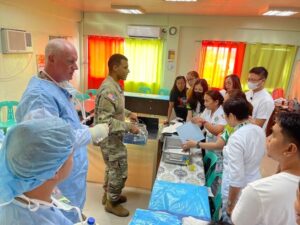
Story by Maj. Matthew Pargett
I Corps
FORT MAGSAYSAY, Philippines—Highlighting the U.S.’s commitment to supporting the Philippines in serving Filipino communities, members of the 8th Forward Resuscitative Surgical Detachment (8th FRSD) rolled up their sleeves to share best practices, build multinational capacity, and learn from their professional medical counterparts on the island of Batanes, in the Luzon Strait from April to June. As medical professionals serving in the U.S. Army, the experience and capabilities they provide are critical to support military operations. Whether treating patients in natural disasters, in combat, or through routine medical care in communities worldwide, initiatives that offer the exchange of knowledge help build capacity and trust. For the medical professionals of the 8th FRSD, this exchange was a worthwhile experience to advance medical capabilities and build professional relationships.
Speaking on his experience working alongside Filipino medical professionals in the Batanes General Hospital, Maj. Jason Mann, a certified registered nurse anesthetist with the 8th FRSD, said, “I always find it very rewarding to observe the methods and practices of medical providers of different nations.”
“From a strategic viewpoint, it helps to forge and strengthen the relationships between the U.S. and the people of the Philippines,” and “From the tactical viewpoint, the training that we provided will result in an improved level of care at the local hospital and may potentially save lives.”
Having participated in similar exchanges worldwide, Mann went in with an open mind and the intention to share his knowledge.
“The Physicians and Nurses of the Philippines are very well trained,” but, “The Batanes islands are quite remote, and resources are limited.”
“They are the masters of making the best with what they have,” said Mann, stressing that it is all about managing resources for these medical professionals.
“A seriously injured patient or mass casualty situation would deplete the emergency medical supplies in a matter of hours or even minutes,” he said. “Without regular and robust resupply, our ability to provide lifesaving care would become severely diminished and eventually ineffective.”
This exchange also included other medical professionals, including an Intensive Care Unit (ICU) Nurse and an Operating Room (OR) Technician, who brought their own experiences, expertise, and desire to collaborate with the Filipino medical staff to the exchange.
While Mann made it clear that the exchange was incredibly worthwhile, he also acknowledged that the challenges they observed helped prepare them for conditions they might face in future assignments or other exchanges around the world.
“The opportunities available at Batanes are ones that would likely never be available in the United States,” said Mann, stressing that the environment, limited supplies, and creative solutions of the staff showed them unconventional ways to continue care when equipment and time are short.
“The creativity, innovation, and resourcefulness that they employ are directly applicable to Army medical professionals to prepare them for working in a deployed austere environment,” said Mann.
“I took away several lessons that I will be able to apply to my practice.”
While deployed in support of U.S Army Pacific’s Operation Pathways, a campaigning model that solves operational and strategic problems linking tactical action – exercises, experiments, and theater security activity – to generate military effects, Soldiers participating in exercises like these regularly train, support, and help build readiness and capacity with allies and partners throughout 21 countries across the Indo-Pacific. By participating in this exchange, the soldiers of the 8th FRSD enhanced their and the hospital staff’s preparedness for various medical challenges, ultimately improving the quality of care available to local Filipinos.